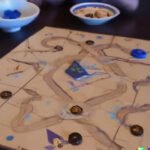The Classic Mouse Trap Board Game has been a beloved staple of family game nights for decades, captivating players with its clever contraptions and exciting gameplay. This article will delve into the rules and strategies of this iconic game, helping both new and seasoned players master the art of trapping mice.
Since its release in 1963 by Ideal Toy Company, the Classic Mouse Trap Board Game has remained a popular choice among board game enthusiasts. Its unique combination of strategy, luck, and suspense has made it a timeless favorite. Over the years, the game has undergone minor updates and tweaks but has managed to maintain its charm and appeal.
In this article, we will explore everything you need to know about the Classic Mouse Trap Board Game. From setting up the game board and components to understanding the intricate mechanics of the mouse trap contraption, we will guide you through each aspect of gameplay.
Additionally, we will provide valuable tips and strategies to help increase your chances of victory. So gather your family or friends, set up the game board, and get ready for an exhilarating adventure with the Classic Mouse Trap Board Game.
Getting Started
Setting up the Mouse Trap Board Game is an important step to ensure a smooth and enjoyable gameplay experience. Follow these step-by-step instructions to get started:
- Open the Box: Begin by opening the box and removing all the components of the game. These typically include the game board, mouse figures, cheese tokens, die, various pieces of the Mouse Trap contraption, and any additional game cards or accessories.
- Assemble the Game Board: Unfold the game board and place it in the center of your playing area. Make sure it lies flat and is easily accessible to all players.
- Place the Mouse Figures: Each player should choose a colored mouse figure and place it on one of the corresponding starting spaces indicated on the board. The number of starting spaces may vary depending on the edition of the game, but there is usually an equal number for each player.
- Set Up the Mouse Trap Contraption: Carefully assemble all components of the Mouse Trap contraption according to their designated spots on the game board. This may involve connecting different traps, ramps, levers, and other mechanisms as instructed in the rulebook. The contraption serves as both a central gameplay element and a visual spectacle.
- Distribute Cheese Tokens: Place all cheese tokens in a central location near the game board. These tokens will be used throughout gameplay as players try to collect them for points.
- Prepare Additional Components: If your edition includes any extra components such as game cards or special dice, shuffle or separate them accordingly and place them within easy reach of all players.
- Determine First Player: Finally, decide who will go first by rolling the die or using any predetermined method such as youngest player goes first or clockwise rotation.
Once you have completed these steps, you are ready to start playing Classic Mouse Trap Board Game. Remember to read through and familiarize yourself with the rules before beginning gameplay for a better understanding of the game’s mechanics and objectives. Enjoy the nostalgic thrill of setting up the Mouse Trap Board Game and get ready for a fun-filled adventure.
Objective
The objective of the Classic Mouse Trap Board Game is to be the last player with a mouse left on the game board while avoiding capture by the trap. The game is suitable for 2-4 players, and each player starts with four mice of their chosen color.
Setting up the Game
Before starting, all players agree on a starting player. Each player chooses their color and places their four mice in their designated “Safe” area at one end of the game board. The game board should be set up according to the instructions provided, with each contraption piece placed in its corresponding spot. The cheese wheel should be placed on top of its platform, ready to trigger the trap once set off.
Rolling the Dice
To determine turn order, players take turns rolling one die. The player with the highest number goes first, followed by the next highest number, and so on. If there is a tie between two or more players, those players must roll again until there is a clear order established.
Taking Your Turn
On your turn, roll both dice and move one of your mice forward according to the total value rolled. You can choose to split the value between two different mice if desired, moving each mouse accordingly. When moving your mouse(s), you must follow any specific instructions or limitations indicated by spaces on the game board.
Cheese Spaces
When landing on a space labeled with cheese slices and numbers (e.g., “Cheese Slice x2”), you are allowed to collect that number of cheese tokens from those available. These tokens can be used during gameplay to temporarily boost your chances or hinder an opponent’s progress.
Cat Spaces
If you land on a space marked with a cat icon, you must halt your movement immediately and skip any subsequent actions for that mouse. Your turn ends, and play passes to the next player.
Building and Activating the Trap
As you progress through the game board, collecting cheese tokens along the way, you also have the option to gradually build the mouse trap. Each time you collect a cheese token, you may choose to place it on one of three spaces on the contraption that corresponds to your current position. Once all three spaces are filled for any contraption section (including both trap pieces and mechanisms), that section will be complete.
When a player successfully builds a contraption section, they can activate it on their next turn by using a cheese token. This triggers a sequence where the mouse is moved towards its eventual capture inside the trap. Players must carefully strategize when and how to activate their sections for maximum effect in capturing opponents’ mice.
To win the game, players must skillfully navigate their mice around obstacles while sabotaging their opponents’ progress and successfully capturing their mice with the contraption’s trap mechanism. The last player with at least one mouse remaining on the game board is declared the winner of the Classic Mouse Trap Board Game.
Player Turns
Once the setup is complete and the objective is clear, it’s time to dive into the exciting gameplay of the Classic Mouse Trap Board Game. Each player will take turns as they strive towards their goal of capturing their opponents’ mice. This section will outline how to take your turn in the game and what actions you can choose from.
During your turn, you will roll the die and move your mouse-shaped game piece along the designated path on the board. The number rolled on the die determines how many spaces you can move. As you navigate through the board, you may encounter various space types such as cheese spaces or action spaces.
If you land on a cheese space, lucky you. Collect a random cheese wedge token from the pile. These cheese wedges will come in handy later on when activating certain traps or actions. The more cheese wedges you collect, the better your chances of executing strategic plans.
On action spaces, prepare for some excitement. These spaces require players to perform specific actions dictated by the instructions listed on those spaces. It could be anything from playing a part in triggering one of the contraption components to gaining an advantage over other players.
In addition to moving along the board and encountering different spaces, players also have an opportunity to use their collected cheese wedges during their turn. Cheese wedges can be used strategically to activate certain traps within th e game’s contraption or to activate special abilities that can give players an edge over their opponents.
It’s important to note that each player has only one chance per turn to use a trap or activate an ability with their collected cheese wedges. Choose wisely when deciding whether it’s the right moment to utilize these resources for maximum impact.
Now that we understand how a turn unfolds in the Classic Mouse Trap Board Game, let’s explore further into its mechanics by diving into Section 5: Understanding the Mouse Trap Contraption: Components and Mechanics.
Understanding the Mouse Trap Contraption
The Mouse Trap contraption is the heart and soul of the Classic Mouse Trap Board Game. It is a complex system of interconnected components that work together to create a thrilling chain reaction that culminates in the capture of the opponent’s mouse. Understanding these components and how they interact is essential to success in the game.
At the center of the Mouse Trap contraption is, of course, the actual trap itself. This consists of a large plastic boot on a spring, poised to snap shut at just the right moment. The trap is activated by players throughout the game, setting off a series of events that ultimately lead to their opponent’s mouse being caught.
To activate the trap, players must first navigate their mice through an obstacle course filled with various other components. One such component is the diverter, which can be maneuvered to change the direction that mice will travel. Understanding how this diverter works and strategically using it can greatly impact gameplay.
Another important component is the crank set. Players take turns turning this crank, which sets several gears into motion. As these gears turn, they trigger other mechanisms in succession, creating a domino effect that leads to the final capture of the mouse.
Overall, understanding how each component fits into the overall mechanism of the Mouse Trap contraption is key to navigating and manipulating gameplay strategically. By studying and familiarizing themselves with these mechanics and their interactions, players can gain an edge over their opponents.
| Component | Function |
|---|---|
| Trap (boot on a spring) | Captures opponent’s mouse when activated |
| Diverter | Changes direction of mouse movement |
| Crank Set | Activates the series of gears and mechanisms |
| Gears | Transmit motion and trigger other components |
By understanding the purpose and functionality of each component, players can develop sound strategies and make informed decisions to increase their chances of winning. The Mouse Trap contraption adds an exciting level of unpredictability to the game, making it a favorite among players of all ages.
Gameplay Strategies and Tips for Success
While the Classic Mouse Trap Board Game may seem simple on the surface, there are strategies and tips that can greatly improve your chances of success. By understanding the game mechanics and employing smart tactics, you can increase your odds of trapping your opponents’ mice and securing victory. Here are some gameplay strategies to consider:
- Stay Aware of Your Opponents: Pay attention to the moves and decisions of your fellow players. By observing their actions, you can anticipate their next moves and plan accordingly. This will allow you to set traps strategically and position your mice in places that are less likely to be captured by others.
- Timing is Key: The timing of your actions can make a significant difference in the outcome of the game. For example, if you notice that an opponent’s mouse is about to land on a space where they could potentially trap one of yours, it may be wise to use your turn to move another one of your mice out of harm’s way instead.
Additionally, keep an eye on when the contraption is close to being triggered so that you can time your moves effectively for maximum impact. - Utilize Cheese Wedges Wisely: Cheese wedges play a crucial role in this game as they allow you to move forward multiple spaces with a single roll of the dice, potentially bypassing dangerous areas or getting closer to completing a full loop around the board. It’s essential to use these cheese wedges strategically and save them for moments when they can give you a significant advantage.
- Balance Risk and Reward: The Mouse Trap contraption adds an element of unpredictability to the game, making it necessary to evaluate risks versus rewards carefully. Taking calculated risks such as trying to lure opponents’ mice into certain areas or triggering specific parts of the contraption at opportune moments can swing the game in your favor.
By implementing these gameplay strategies and tips, you’ll be better equipped to navigate the Classic Mouse Trap Board Game and increase your chances of coming out on top. Remember, though, that luck still plays a significant role in this game, adding an exciting element of surprise and unpredictability. Embrace the fun and challenge yourself to outwit your opponents while enjoying the nostalgia of this classic family board game.
Frequently Asked Questions about Classic Mouse Trap Board Game Rules
Can you move your mouse token backward?
No, in the Classic Mouse Trap Board Game, players can only move their mouse token forward along the designated spaces on the game board. Moving backward is not allowed.
What happens if a player lands on a space with another player’s mouse token?
If a player lands on a space that already has another player’s mouse token, they will have to wait until that player’s turn is over before they can proceed. This means that they cannot take any actions or move their own mouse token until it is their turn again.
Can you use the cheese wheel and steel marble at any time during the game?
Yes, both the cheese wheel and steel marble can be used at any point during the game. Players can strategically choose when to activate these special components to either hinder their opponents or advance themselves towards victory.
How does the cage work?
The cage is an important component of the Mouse Trap contraption. When a player lands on a space with a cage symbol, they must trigger it by turning the dial located next to it. This releases a plastic cage which then falls onto any nearby mouse tokens, capturing them temporarily and causing those players to miss one turn.
What happens if multiple players reach the finish space at the same time?
If two or more players reach the finish space simultaneously, they will each roll one dice to determine who wins. The player with the highest number rolled wins the game. In case of a tie, those tied players will continue rolling dice until there is a clear winner.
Are there penalties for landing on certain spaces?
There are no direct penalties for landing on certain spaces in the Classic Mouse Trap Board Game. Each space simply dictates what action needs to be taken next or triggers certain components of the Mouse Trap contraption. However, some spaces may require players to wait or miss a turn if another player’s mouse token is already there, as mentioned earlier.
These frequently asked questions should help clarify any common uncertainties about the Classic Mouse Trap Board Game rules. Remember that the objective of the game is to be the first player to successfully trap all opponents’ mouse tokens in the contraption and reach the finish space. Good luck and have fun playing.
Classic Mouse Trap Board Game Variations and Additional Rules
The Classic Mouse Trap Board Game has captured the hearts of players for generations, but did you know that there are variations and additional rules that can be added to enhance gameplay? These variations allow for added excitement and strategic thinking, keeping the game fresh and engaging even for experienced players.
One popular variation is the “Speedy Mouse” rule. In this version, players must complete their turn within a set time limit. This adds a sense of urgency to the game and forces players to make quick decisions. It also prevents any one player from taking too long on their turn, keeping the game moving at a brisk pace.
Another variation is “Team Play.” In this version, players are divided into teams and work together to trap all the mice on the board. Each team takes turns collectively making decisions and executing actions. This variation encourages cooperation, communication, and teamwork among players.
For those looking for an extra challenge, there is the option of playing with the “Hard Mode” rule. In Hard Mode, certain actions or components of the Mouse Trap contraption are modified to make it more difficult to set off. This requires players to plan their moves strategically and think several steps ahead in order to successfully trap all the mice.
By incorporating these variations and additional rules into your gameplay, you can add a new level of excitement and strategy to the Classic Mouse Trap Board Game. Whether you’re looking for a quick-paced game, cooperative play, or a greater challenge, these options allow you to customize your experience and keep coming back for more fun with family and friends.
| Variation | Description |
|---|---|
| Speedy Mouse | Players must complete their turn within a set time limit. |
| Team Play | Players are divided into teams and work together to trap all the mice on the board. |
| Hard Mode | Actions or components of the Mouse Trap contraption are modified to make it more difficult to set off. |
Conclusion
The Classic Mouse Trap Board Game has stood the test of time, captivating players young and old with its charming combination of strategy and suspense. Throughout its history, this classic game has remained a staple in family entertainment, bringing hours of fun and laughter to households everywhere.
From setting up the game board to navigating the intricacies of the Mouse Trap contraption, players have been challenged to outwit their opponents and successfully trap their virtual mouse. But beyond the competition lies a sense of nostalgia and shared memories that make this game truly special.
As we’ve explored in this article, the Classic Mouse Trap Board Game offers much more than just a simple set of rules. It represents a gateway into a world where imagination reigns supreme and anticipation fills the air. Whether you’re introducing this game to a new generation or revisiting it after years of not playing, there is a joy in reconnecting with the past and reliving those moments of carefree play.
In today’s modern world, where smartphones and video games dominate our leisure time, it’s refreshing to see that traditional board games like Mouse Trap still hold their own. This enduring appeal can be attributed to many factors: its easy-to-understand mechanics, its interactive components, and its ability to bring people together for hours on end.
In an age where screens have become the norm, gathering around a table to play Mouse Trap brings us back to simpler times – when bonding with loved ones meant engaging in face-to-face interactions.
So whether you’re setting up the board for your first match or celebrating yet another victory over your friends or family members, remember to embrace the fun and nostalgia that the Classic Mouse Trap Board Game brings. Cherish these moments as opportunities for connection and shared experiences.
Let laughter fill your home as you eagerly await each roll of the dice and every twist of fate within that fantastical contraption. And most importantly, treasure this timeless classic for what it is – an embodiment of the joy and togetherness that board games can bring.

I love playing all kinds of games – from classics like Monopoly to modern favourites like Ticket to Ride.
I created this blog as a way to share my love of board games with others, and provide information on the latest releases and news in the industry.





